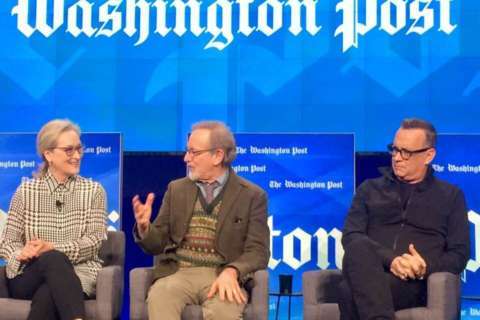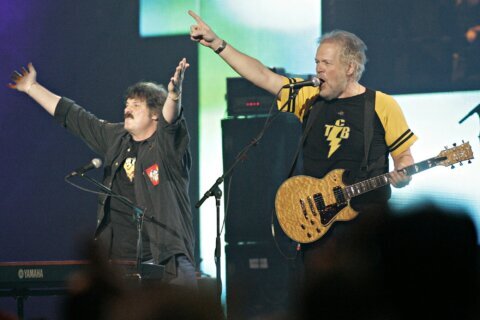WASHINGTON — It’s hard to believe that Tom Hanks and Meryl Streep have never starred in a movie together, just as it’s hard to believe that Streep has never acted for Steven Spielberg.
All three icons collide in the new historical drama “The Post,” which opens nationwide Friday, providing a timely defense of the free press in a good old-fashioned piece of entertainment.
Set in 1971, years before the investigative journalism of Watergate in “All the President’s Men” (1976), The Washington Post is a mere regional newspaper run by classy publisher Katharine Graham (Streep), who’s about to take the company public after her husband’s death, and gritty editor Ben Bradlee (Hanks), who lives and breathes to break the next big scoop.
After The New York Times is sued by President Nixon, the duo faces a moral dilemma over whether to publish the Pentagon Papers, secret government files detailing U.S. involvement in Vietnam from 1945 to 1967, leaked by fed-up whistleblower Daniel Ellsberg (Matthew Rhys).
Let’s face it: It’s impossible for anyone to follow Jason Robards’ Oscar-winning Bradlee in “All the President’s Men,” just as it’d be impossible to imagine anyone other than Robert Redford and Dustin Hoffman as Woodward and Bernstein. Even so, Hanks bends the role to his own sympathetic persona, finding his own barrel-chested walk and gruff voice, rolling up his sleeves, whacking a newspaper on the desk and barking “not now” to interrupting reporters.
Conversely, Graham never appeared in “All the President’s Men,” so Streep has free rein. Her choice of nervously fidgeting with her eyeglasses shows Graham’s gradual feminist rise with a telling glance during an early board meeting, where she’s too timid to speak, even though she has the answers scribbled right in front of her. We gladly watch her posture change as she finally makes the tough call to publish. Expect Streep to land her record 21st Oscar nod.
Surrounding these two legends is a supporting cast that reads like a “who’s who” of our current Golden Age of Television: Bob Odenkirk (“Breaking Bad”), Carrie Coon (“Fargo”), Bradley Whitford (“The West Wing”), Sarah Paulson (“The People vs. O.J. Simpson”), Bruce Greenwood (“St. Elsewhere”), Alison Brie (“Mad Men”) and Matthew Rhys (“The Americans”).
Spielberg reportedly watched 3,000 audition tapes in a single week for casting director Ellen Lewis (“Forrest Gump”), one of many expert collaborators, from cinematographer Janusz Kaminski (“Schindler’s List”) to composer John Williams (“E.T.”). Meanwhile, costume designer Ann Roth (“The Hours”) created the ’70s wardrobe, while production designer Rick Carter (“Lincoln”) recreated the old Post building — right down to the daily news on each desk.
Spielberg said the period design inspired him to pull his camera back to capture more group shots than piercing close-ups. Angles create larger-than-life figures like the newspapermen in “Citizen Kane” (1941), while symbolic over-the-shoulder shots express which character has the power in each scene and high angles denote moments of extremely important decisions.
It’s a testament to Spielberg that, after all these years, he continues to find dynamic ways to film mundane moments. When Odenkirk calls Ellsberg on a parking garage payphone, his face reflects on the metallic phone surface. When the printing presses roll, we see intimate close-ups of the nostalgic typeface. And when Hanks and Streep make their final exit out of the warehouse, stacks of newspapers beautifully spiral like DNA strands toward the rafters.
The film instantly becomes one of cinema’s most romantic love notes to journalism, just like the recent Best Picture-winning “Spotlight” (2015). In fact, “Spotlight” screenwriter Josh Singer was brought in to rewrite the script with debut screenwriter Liz Hannah. I suspect it’s Singer who found nifty tricks to bury the exposition, like Graham practicing what she’s going to say before the board meeting, allowing the writers to sneak in important character backstory.
It’s a script packed with thematic weight on (a) feminism, (b) war and (c) freedom of the press.
On the subject of feminism: The arc begins with the all-male (all-white) board rooms making snarky comments toward Graham, suggesting she’s not fit to lead the company. She simply smiles and says, “Thank you for your frankness,” taking the high road. By the end, when Graham exits the Supreme Court, a new generation of young women watches her in awe.
On the subject of war: The script smartly sets up the conflict by showing the precise moment that Ellsberg snaps upon hearing Secretary of Defense Robert McNamara lie to the press about his feelings on the war. This point is reiterated when The Post uncovers top-secret files showing the war was 10 percent for the Vietnamese, 20 percent to thwart communism and 70 percent just to save face. Five administrations lied while people died — just for PR purposes.
Finally, on the subject of a free press: The script champions the First Amendment as being first for a reason. It’s not ninth or tenth, but the first attempt by the Founding Fathers to protect our democracy. “The Post” paints journalists as the public’s last best defense against the powerful. As Bradlee says of the Supreme Court case, “If we lose, the country will lose.”
And yet, rather than sanctimoniously putting the press on a pedestal, the script also exposes the complicity of journalists getting chummy with their subjects. Bradlee feels guilt over his friendship with the Kennedys, recounting a story of a bloody Jackie hugging Bradlee’s wife at Walter Reed and telling him, “None of this ends up in your newspaper.” Likewise, Graham feels guilt over her friendship with McNamara, who regularly attends her dinner parties.
“Those days have to be over,” Bradlee says to Graham in a moment of soul-searching. This builds to a powerful double meaning in their final conversation. Graham says, “We don’t always get it right, but I think if just we keep on it, that’s the job,” to which Bradlee smiles, “Yes it is.” It’s as much an admission of personal growth as it is a statement on the industry.
As the film ends by voyeuristically peering in the windows of the West Wing and playing Nixon’s real-life audiotapes over brooding music, “The Post” serves not only as a poignant prequel to “All the President’s Men,” but a timely defense of the embattled free press today.
“Nothing’s riding on this except the, uh, First Amendment to the Constitution, freedom of the press and maybe the future of the country,” Robards’ Bradlee once sarcastically said to his gutsy reporters. “Not that any of that matters, but if you f**k up again, I’m gonna get mad.”
Thankfully for us, Spielberg doesn’t muck it up. He gets it exactly right.

This review is Part 2 of 2 on “The Post.” Click here for a Q&A with Spielberg, Streep and Hanks.








